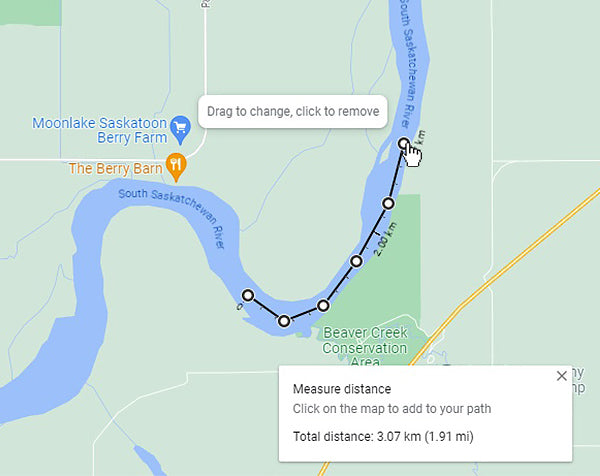How long will it take to paddle from A to B? Calculate your paddling speed
Hi everyone, it's the folks from Eb's again! As a paddling shop we get a lot of questions about how long it takes to paddle some common routes nearby, such as from Fred Heal Canoe Launch to the city. Having some idea of your paddling speed helps you plan distances, coordinate pick up times, and decide how much food and water you need to bring.
Start with your estimated base paddling speed.
Most people paddle close to the same speed that they walk. A ballpark figure is about 4-5 kilometers per hour (kph) for someone with some paddling experience. Factor in your skill level, fitness, boat type and the number of breaks you think you'll take to come up with a base paddling speed. For example if you are a beginner in a wide, flat recreational kayak you may be closer to 3 kph. If you are a fit person paddling a sleek tandem canoe with a partner you might be 6 kph.

Factor in current.
The South Saskatchewan River that runs through Saskatoon will travel approximately 2 kph at 100 cubic metres per second (cms). Add this speed to your base paddling speed if you are going with the current, subtract it if you are going against it.
This speed will vary a lot depending on how wide and deep the river is where you are paddling and what the current flow level is. A river will generally flow more slowly near shore and in wide sections, and more quickly in deeper and narrower areas. You can check the current flow of the South Saskatchewan on the Water Security Agency's web page.
Look at wind speed and direction.
Any decent weather report will give you wind direction and speed. Wind speeds of 10 kph or less won't affect you too much unless you are in an inflatable dinosaur; winds of 20 kph and up will affect your speed significantly. The Beaufort Wind Scale is a great reference for estimating wind effect. Remember to look at wind direction too - if you are able to paddle along a protected shore (or not) this will make a big difference in your speed.

Measure the distance you plan to paddle.
Google's map measurement tool is great for calculating travel distance. Open Maps and right click to get the drop down that includes the tool, then simply click points along the path you will take.

Then with some simple math you've got your estimation. Here's an example. You calculated your base paddling speed (with water breaks!) at 4 kph. You plan to paddle from Fred Heal Canoe Launch in to Saskatoon, which is 18 km. The river is running at 100 cms so you add 2 kph on to your base speed to get 6 kph travelling speed. This would give you a paddling time of 3 hours but because you have a 15 kph wind from the NW you give yourself 3.5 hours.
This will get more accurate after you've done this a few times and get more of a feel for how fast you really paddle. Good luck and have fun out there folks :)


Leave a comment